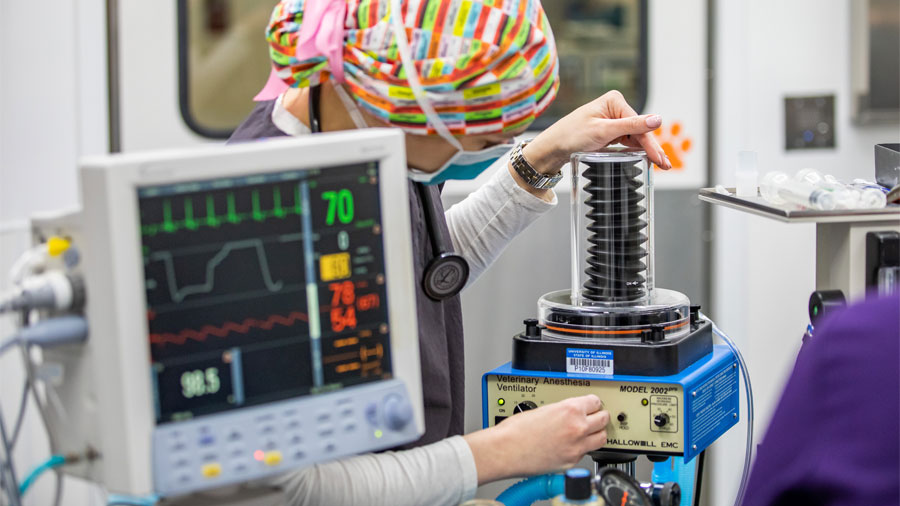There was something wrong with Maia. The young ferret had a fever, was losing weight, and was not as active as usual. But even after her local veterinarian performed initial blood tests, the findings did not lead to a distinct diagnosis.
Fortunately, Maia’s veterinarian consulted with Dr. Krista Keller. Dr. Keller is one of several faculty members at the University of Illinois College of Veterinary Medicine who are board-certified specialists in zoological medicine. Only about 400 doctors worldwide can claim that specialty designation.
“There are two major diseases to look for when you have a fever of unknown origin in a younger ferret. They are ferret systemic coronavirus and disseminated idiopathic myofasciitis,” Dr. Keller says.
According to Dr. Keller, both diseases are very serious to ferret health. Ferret systemic coronavirus is unrelated to the coronavirus that causes COVID in humans. It causes a severe inflammatory reaction in many internal tissues. Disseminated idiopathic myofasciitis (DIM) is a rare autoimmune condition involving inflammation in the surfaces of muscles throughout the body.
Diagnosing Disseminated Idiopathic Myofasciitis
The diagnosis of DIM was confirmed when her local veterinarian took a muscle biopsy from Maia’s thigh and sent it to the college’s Veterinary Diagnostic Laboratory. In this disease, the attacking autoimmune system can be seen via microscopic inspection called histopathologic evaluation. Inflammatory cells layer on the outside of the muscles in a characteristic pattern.
Without treatment, DIM is fatal in ferrets. Due to the complexity and danger of handling the required medications, however, the treatment is usually offered only at a specialty hospital, like the Veterinary Teaching Hospital. Despite the expense and inconvenience of making six trips to Urbana—a two-hour drive—over the course of four months, along with special accommodations for their ferret at home during treatment, Maia’s human family members opted for the treatment.
Not the Stereotypical Companion
Dr. Keller was not surprised to learn that Maia’s parents were willing to go to great lengths for their sweet ferret.

“I’ve always known the human-animal bond isn’t species specific,” says Dr. Keller. She works with canids that are not canines (such as wolves and foxes) and equids that are not horses (such as zebras at the zoo). She even works with felines like tigers and servals. However, her passion is working with animals that are part of people’s families. Many people may be surprised at what others will include in that family.
“Whether fish, lizards, snakes, parrots or other species,” Dr. Keller says, “while I treat the animal in need of veterinary care, I strive to work within the human animal bond to heal the whole family.”
In Maia’s case, her owners made a significant commitment. They even faced some health concerns for the humans in the household.
“I think it’s really laudable how our clients dedicate their time, their effort, their finances, their life, to a family member, regardless of that family member’s species,” says Dr. Keller. “Working with my clients to deliver the best veterinary care for their nontraditional companion animal is one of the biggest joys of my career.”
Treatment for Disseminated Idiopathic Myofasciitis
The medications used to treat an autoimmune disorder like DIM require a great deal of precaution and planning. Cyclophosphamide, a chemotherapy and immune-suppressing drug, has the potential to be excreted from the patient receiving it. Thus there is potential to expose other family members to the toxic medication.
“Because of the formulation of cyclophosphamide, we had to schedule afternoon visits so that the medication could be prepared by our veterinary pharmacists in the morning,” says Dr. Keller. “When Maia arrived for the visit, we had to make sure the people handling her didn’t have health concerns and were wearing protective equipment.”
At home, Maia had to be handled carefully and isolated from the rest of the family, ferret and human alike. Another medication Maia was prescribed was chloramphenicol, an antibiotic with handling risks, like bone marrow suppression in some people if they are exposed. Fortunately, Maia was very good about taking her meds. (The flavor of her chloramphenicol was changed multiple times to encourage her to take it.) At times, Maia had to be syringe fed because DIM made it difficult for her to eat on her own. She needed the extra nutrition to regain lost weight while recovering from the disease.
What Causes Disseminated Idiopathic Myofasciitis?
The first case of disseminated idiopathic myofasciitis in ferrets was reported in 2003. Since then, the disease has been linked to a compound formerly used in a canine distemper vaccination given to ferrets.
“The problem is caused by the body’s immune reaction and we suspect it is something in the vaccine formulation,” says Dr. Keller. “Hopefully DIM will become even more rare now that ferret vaccines have been reformulated.”
She stresses that ferrets should be vaccinated against rabies and distemper despite the small risk of DIM. “DIM is treatable and cannot be transmitted to other animals or people. Rabies and distemper, on the other hand, are fatal and can be spread,” she notes.
The American Ferret Association recommends USDA-licensed and species-labelled vaccinations against both of these diseases for all ferrets.
Happy Ending for Maia, Education for Veterinary Students
Near the end of her treatment regimen, Maia was feeling brighter and regaining weight. When the treatments were discontinued, the care team at the Veterinary Teaching Hospital were excited to play and interact with Maia without layers of protection between them.
This case provided a great learning opportunity for future veterinarians. “Maia’s complicated and potentially dangerous treatment course gave our veterinary students the experience of practicing safety and educating owners about these drugs,” Dr. Keller says.
Maia is in remission now and back to being a playful, happy, young ferret. “I’m hopeful that her DIM will not recur,” says Dr. Keller. “But if it does, we will be here to help her and her family once again.”
By Matt Morton
Featured photo by Steve Tsang on Unsplash

![[stock photo of a pet ferret]](https://vetmed.illinois.edu/wp-content/uploads/2021/12/pc-ferret-unsplash.jpg)


